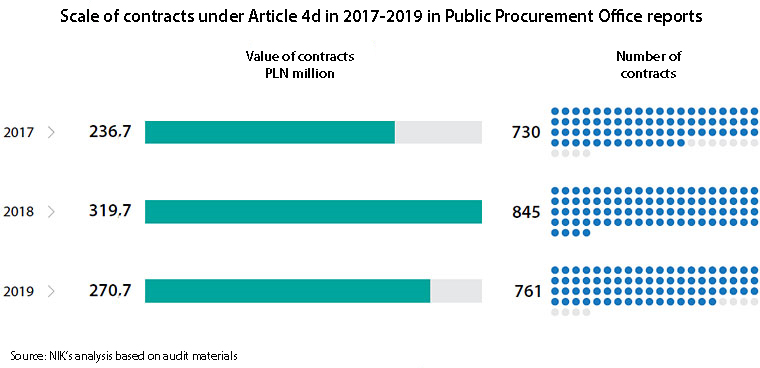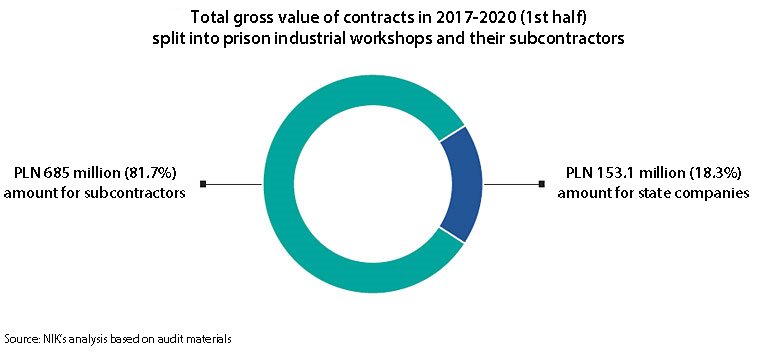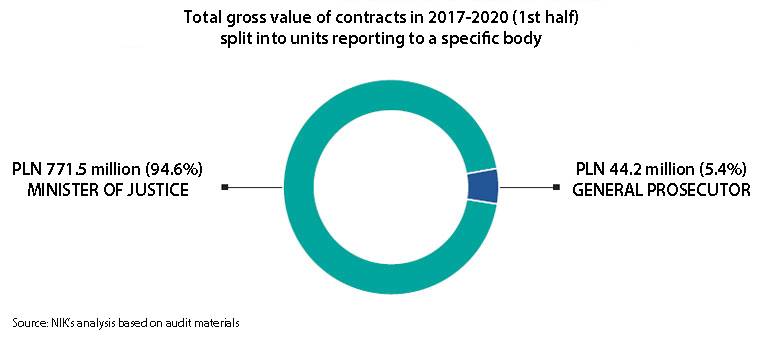Work helps inmates define and maintain their social roles after they leave prison. It also has a positive impact on keeping order in prison facilities. Work enables prisoners to satisfy their economic needs, or their families’ needs (e.g. by paying alimony or child maintenance). In 2018 and 2019, the average of nearly 23% of inmates were on paid employment and in 2020 it was less than 18%.
In 2013, the Public Procurement Law Act was amended to facilitate rehabilitation in workplaces which operated in ordinary market conditions. The final shape of the amendments was defined in 2016. In NIK audits conducted since 2019, a mechanism was identified where public contracts were awarded beyond the Public Procurement Law Act. Prison industrial workshops started to award contracts to subsequent subcontractors and so the headcount of inmates who worked on executing contracts was too low. Therefore, NIK carried out an ad hoc audit of that mechanism. In view of the identified irregularities and their weight, NIK summed up several other audits from 2018 to 2020 which covered – at least partly – the Article 4d application issue.
Considering the results of those audits, NIK negatively evaluated the mechanism of improper exclusion from public procurement regulations of contracts awarded to prison industrial workshops which did not meet their obligation to hire prisoners. The employment of prisoners was the objective behind adding the said exclusion to the Act.
Key findings
The data obtained by NIK from 1 January 2017 to 30 September 2020 from 11 prison industrial workshops shows that they were awarded 1295 contracts totalling nearly PLN 845 million gross. Nearly 18% of all contracts gross (i.e. PLN 122 million) were outsourced only to one private company.

Two largest contracts under Article 4d were awarded to PEPEBE company from Włocławek. The first one was related to the construction of two prosecutor’s offices in Sosnowiec. Its value totalled PLN 26.4 million gross, of which subcontractors were outsourced works worth over 93% of that amount. The second order concerned building a construction hall in a prison in Sztum. Its value was nearly PLN 23 million, of which works worth 93% of that amount were outsourced to subcontractors.
In 2020, the number of contracts awarded under Article 4d plummeted. After NIK audits, based on audit recommendations, companies’ divisions which used outsourcing in 100%, were closed. Also, the General Director of the Prison Service in 2019 issued new guidelines for subordinate units on awarding contracts under Article 4d.
An example is the clothing company “RAKON” in Racibórz. In 2017-2019, it was awarded 83 contracts under Article 4d worth nearly 90% of that amount. Twenty largest contracts (worth nearly PLN 39 million gross) were related to various construction works, of which 96.5% of their value were outsourced to subcontractors. From 1 January to 30 September 2020, RAKON as a clothing company was awarded five contracts under Article 4d for the total of PLN 0.5 million gross. No works were outsourced to subcontractors. The company director communicated that the construction division was liquidated.
As a rule, the prison industrial workshops, which received contracts under Article 4d from contracting authorities, i.e. units reporting to the Minister of Justice – Prosecutor General, acted as intermediaries. They entrusted the actual task performance to subcontractors, i.e. third parties not being the prison industrial workshops. In case of workshops run as state companies, awarding contracts to subsequent subcontractors was not covered by the Public Procurement Law Act, because these workshops are not obliged to apply these provisions. In such cases the workshops could select subcontractors at their own discretion, being at the same time a party to the agreement with the contracting authority which awarded them a contract in a non-competitive procedure.
According to NIK, under Article 4d of the Public Procurement Law Act contracts should be awarded to prison industrial workshops which may perform tasks on their own. Contracts may be redirected to subcontractors only in extraordinary cases.
NIK has noted that prison industrial workshops run as state companies performed only a small part of works commissioned by contracting parties. They mainly charged a kind of “margin” for themselves. And for the contracting parties, Article 4d was attractive as it relieved them from painstaking and difficult tender procedure.

The transfer or signing agreements for nearly 82% of the gross value of contracts for subcontractors indicates clearly that the workshops did not use the support of subcontractors when performing contracts but they actually outsourced the execution of contracts to them. Contracts were transferred to private companies, which - in accordance with applicable law – were not obliged to hire inmates.
The majority of the prison industrial workshops run as state companies transferred more than half of contracts to subcontractors. Only four of them did not exceed 50% and six exceeded 80%.
A company which awarded most contracts to subcontractors was “PRESBET” in Warsaw. As part of 66 contracts under Article 4d worth about PLN 22.7 million gross, the company outsourced contracts at the level of nearly 95%. It hired 33 inmates which made up 3% of all inmates hired in all prison industrial workshops run as state companies. The net profit was PLN 34 thousand net, i.e. only 0.16% of net profit of all prison industrial workshops.
An example of good practice pointed by NIK is a state shoe-making company from Strzelce Opolskie. When executing 39 contracts under Article 4d, of over PLN 202 thousand gross, the company did not use the support of subcontractors. The company hired the biggest group of inmates of all prison industrial workshops run as state companies. It thus provided 314 FTEs which made up as much as 28% of inmates hired in all 11 prison industrial workshops run as state companies. That activity brought a net profit of nearly PLN 7 million, i.e. almost 32% of net profit of all prison industrial workshops.
Most contracts under Article 4d in the prison service were awarded based on one bid only. Prison facilities sent calls for bids to at least three prison industrial workshops. However, the bid was made by only one workshop, the nearest one to the contracting party. Others either did not respond to the call or stated they could not take up the contract execution.
The audit revealed that the audited workshops did not have separate procedures for outsourcing works to subcontractors. Also, the contracting parties failed to specify the manner of selecting subcontractors in agreements. NIK has noted that the discretionary selection of subcontractors by prison industrial workshops run as state companies as well as the selection of workshops which compete with one another based on unclear principles may pose a risk of corruption-prone mechanisms.
That risk was indicated in the Central Training Centre for the Prison Service. In that entity, nearly PLN 370 thousand gross was spent uneconomically – on the design and construction of an obstacle course for course participants in 2018. According to an expert hired by NIK, the amount spent to carry out the investment was over PLN 300 thousand higher than the maximum cost of that investment (i.e. PLN 65 thousand). The uneconomic spending resulted from inaccurate valuation of the obstacle course and insufficient supervision of the investment process. NIK sent a report of possible significant property damage to the prosecutor’s office.
According to NIK, the key reason for irregularities related to the use of Article 4d was insufficient supervision of the Minister of Justice – General Prosecutor over subordinate units. Besides, the Minister of Justice did not implement effective mechanisms to prevent prison industrial workshops from abusing the procedure of outsourcing contracts to subsequent subcontractors.

The idea behind establishing prison industrial workshops was rehabilitation via employment. Such companies may be founded and run e.g. as state enterprises or budget management institutions. The founding body is the Minister of Justice. The prison industrial workshops run as state companies hired: over 61% of inmates in 2017, over 63% of inmates in 2018 and less than 63% from 1 January to 30 September 2019. However, it was not monitored how many inmates were hired to perform individual tasks commissioned under Article 4d. Of 73 agreements signed with the prison industrial workshops, 61 did not include any obligations to hire inmates. Besides, the minimum number of inmates to perform a given task was not defined.
During the audit NIK examined the performance of 38 agreements for the total of nearly PLN 121 million gross. Subcontractors were commissioned works totalling PLN 108 million gross. In 11 cases no inmates were hired or only one inmate was employed. The data obtained by NIK shows that hiring one inmate as part of the above contracts awarded beyond the Public Procurement Law Act was related to spending the average of PLN 669 thousand gross minimum.
Not a single inmate was hired in three examined agreements totalling PLN 772 thousand.
The biggest contract under Article 4d was related to the construction of headquarters of prosecutor’s offices in Sosnowiec – it totalled PLN 26.4 million. On average, from November 2018 to June 2019, 5.4 inmates worked on that investment. It means the average of PLN 4.9 million gross was spent on one employee.
According to the companies’ data, the lowest percentage of inmates’ salaries in relation to the agreements’ values was identified in the court and in the prosecutor’s office which are not prison facilities. It means that the most “natural environment” to hire inmates under Article 4d are prisons and custodies which have inmates willing to work in place.
Recommendations
The Public Procurement Law Act was amended in 2016 to enable units reporting to the Minister of Justice – General Prosecutor to award contracts beyond the Public Procurement Law Act, without the need to connect the contract object with basic activity of the prison industrial workshop. NIK has noted that the amendment did not help achieve the legislator’s objective. Instead of creating conditions to boost employment of inmates, the statutory changes made it easier to transfer public funds to external entities, selected on a discretionary basis, which were not prison industrial workshops and were not obliged to hire inmates, in accordance with applicable law.
In view of the above, NIK recommends that the Council of Ministers amend the Public Procurement Law Act by:
- introducing the requirement to award contracts to prison industrial workshops, provided they perform the key tasks on their own, upon reasonable participation of inmates;
- crossing out the General Prosecutor and the units reporting to him from the list of entities eligible to use this exclusion, as that body cannot exercise supervision over prison industrial workshops.
According to NIK, the minimum participation of inmates in performing individual contracts – at least 30% - should be defined.


